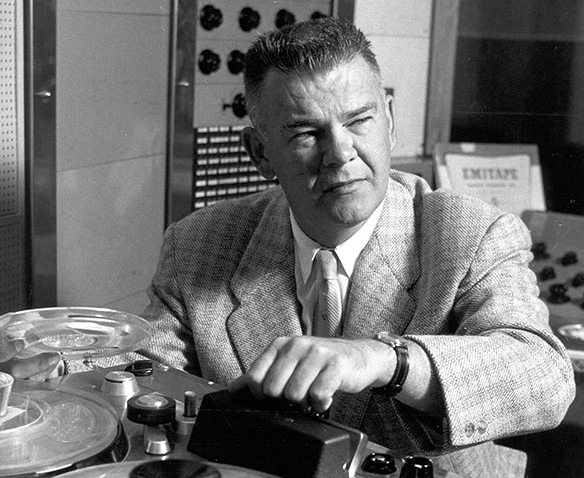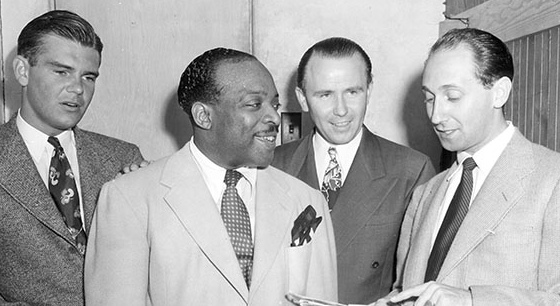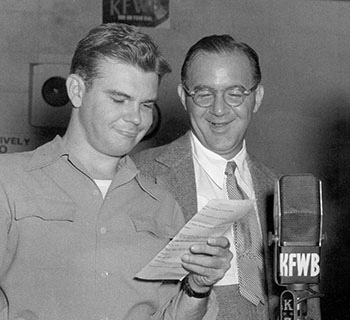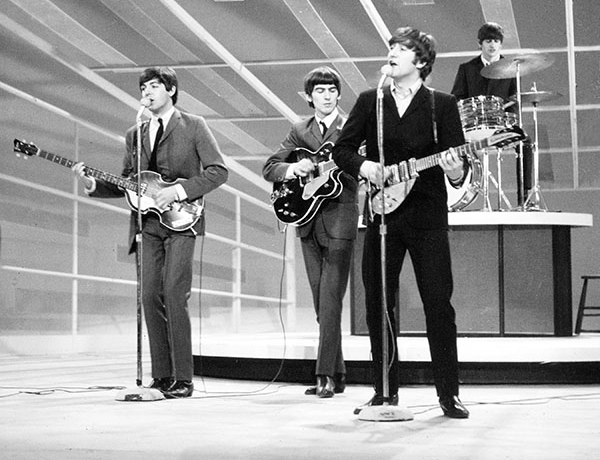The Man Who Hit Pause
Throughout 1963, the fate of the Beatles rested in the hands of one man: Dave Dexter.
by Kenneth Womack

In 1962 and 1963, despite the Beatles’ popularity in the U.K., they were ignored in the United States. Capitol Records’ Dave Dexter repeatedly rejected the Fab Four’s records until he was forced to release “I Want to Hold Your Hand” in December 1963.
In 1975, the Beatles’ first manager, Allan Williams, titled his autobiography The Man Who Gave the Beatles Away. In so doing, he recognized his own complicity in failing to capitalize on the band’s budding musical genius — a role that fell in November 1961 to Brian Epstein, the band’s second manager and the eventual architect of Beatlemania.
Williams was only the first in a long line of gatekeepers who failed to recognize the Beatles’ greatness. Take Dick Rowe, for example. As the head A&R man for Decca Records, Rowe notoriously passed on signing the Beatles after their January 1962 audition, infamously remarking that “groups with guitars are on the way out.”
In terms of neglecting to appreciate the group’s early potential, Williams and Rowe are rivaled only by Dave E. Dexter Jr., the longtime Capitol Records employee who steadfastly refused to release the Beatles’ runaway British hits stateside. When American Beatlemania reached its apex, Dexter was instrumental in repackaging the Beatles for the American marketplace, cannibalizing their original U.K. releases and adding echo and reverb to alter their sound.

Dave Dexter was a jazz man and worked with some of the best jazz musicians and bandleaders of the 1940s and 1950s, including Benny Goodman, the “King of Swing” and the incomparable Count Basie (center with Dexter and Glenn Wallichs, one of the founders of Capitol Records).

Benny Goodman, the “King of Swing”
A Great Jazz Man
Born in Kansas City, Mo., in 1915, Dexter began his career as a music journalist in the 1930s and 1940s with the Kansas City Journal Post and later with Down Beat magazine. A jazz aficionado with a well-honed ear, Dexter produced an album titled Kansas City Jazz that traced the history of the Kansas City jazz scene through the work of such artists as Count Basie and Big Joe Turner.
In 1943, Dexter joined fledgling Capitol Records as a publicity officer, eventually becoming the company’s influential international A&R representative. During this period, he attracted a number of celebrated artists to Capitol, including Frank Sinatra, Peggy Lee, Stan Kenton, Nat King Cole, Duke Ellington and Woody Herman. Dexter also achieved considerable renown for his efforts producing the Duke Ellington jazz standard “Satin Doll.”
In 1944, Dexter produced The History of Jazz, a series of four albums. According to jazz historian Floyd Levin, Dexter “conceived the idea, assembled the impressive array of musicians and personally supervised the entire project. To this day, those great recordings remain among the most ambitious anthologies of jazz history.”
Dexter was a legitimate jazz guru — he understood the music, both how to create it and how to package it. But by the 1950s, Dexter was deriding changes in popular music, particularly the rise of rock ’n’ roll artists such as Elvis Presley, whom he described as “juvenile and maddeningly repetitive.”
Differing Discographies
These examples illustrate how different Beatles albums were in the U.S. and U.K.
•The Beatles’ second album in the U.K. was With the Beatles. Released in November 1963, its 14 songs include “All My Loving,” “Roll Over Beethoven” and “Money.” Nine of the 14 songs were included in the U.S. release Meet the Beatles, Capitol’s first Beatles album. Meet the Beatles also included one track from the Beatles’ first U.K. album and two B-sides.
•The U.S. release The Beatles’ Second Album used the rest of the five songs from the U.K.’s With the Beatles but also picked up Beatles songs from singles and two other U.K. albums.
•Help! was released in August 1965 in both the U.S. and U.K. In the U.S. it included seven Beatles’ songs and padded out with orchestral arrangements from the movie. In the U.K. it had 14 Beatles’ songs and no orchestral arrangements.
•The masterpiece Revolver contained 14 songs in its U.K. version. In the U.S. three of these songs — “I’m Only Sleeping,” “And Your Bird Can Sing” and “Doctor Robert” — were simply lopped off because they had been included in an earlier U.S. release.
•It wasn’t until Sgt. Pepper’s in 1967 that U.S. fans would experience an album the way the Beatles had intended it to be heard.
“The Worst Thing I’d Ever Heard”
In the early 1960s, Dexter’s influence at Capitol Records had become so significant that company president Alan W. Livingston authored a June 1962 memo in which he instructed his colleagues to submit all albums from outside the U.S. to Dexter for his consideration and approval.
Capitol could choose to release albums in the U.S. that had been released internationally by Capitol’s parent company, the EMI Group. EMI was the Beatles’ record company in Britain. That meant it fell to Dave Dexter to decide whether the Beatles would make it in America.
In October 1962, Dexter opted not to release the Beatles’ “Love Me Do” single. He followed suit in early 1963 and rejected “Please Please Me” and “From Me to You,” which were subsequently released by Vee-Jay Records. Soon thereafter, Dexter passed on the option to release “She Loves You,” which had emerged as the U.K.’s best-selling single of all time at that juncture.
“She Loves You” was subsequently optioned by Philadelphia’s Swan Records. Vee-Jay and Swan were small companies that lacked promotional muscle. Those early stateside efforts by the Beatles went largely unnoticed.
In a 1988 interview, Dexter recalled the first time that he heard “Please Please Me:” “The British companies — they wanted us to issue as many of their records over here as possible because [the U.S.] was the biggest record market in the world. And I can only remember when I heard Lennon playing the harmonica on this record, I thought it was the worst thing I’d ever heard.”
EMI racked up nearly 300,000 advance orders in Britain for With the Beatles in the fall of 1963. EMI could no longer wait for its American subsidiary — meaning Dexter — to come around. Capitol was ordered by EMI’s managing director, L.G. Wood, to release the Beatles’ next single without delay. Having originally planned to press a mere 5,000 copies of “I Want to Hold Your Hand,” Capitol earmarked the impressive $50,000 to promote the single in the United States. The Beatles appeared on the Ed Sullivan Show, and American Beatlemania was born.
Things We Said Today
In a memo he sent Feb. 20, 1964, Dexter defended himself to Livingston, writing that “Alan, I make errors in judgment as does everyone else, but when you consider the enormous amount of singles and albums sent to my desk every month … I am frankly amazed that we do not miss out on more hits as the months and years go by.”
Subsequently asked by Livingston to write a detailed report about the records that he had passed on during the previous year, specifically the Beatles, Dexter wrote in an Oct. 1, 1964, memo: “In a carton containing 17 other singles, I received ‘Love Me Do’ and ‘P.S. I Love You’; [I] was not impressed, and so informed Tony Palmer [Dexter’s EMI counterpart] by checking a 6x4 form and airmailing it back to him that same day.”
As he notes in the memo, Dexter changed his tune in late summer, writing that “by the time I returned from England in August of 1963, it was apparent that the Beatles were the hottest thing England had ever encountered, and when I learned that Swan had waived on the group, I then somewhat hysterically started urging Livingston, Gilmore and Dunn to exert every possible pressure on EMI and Epstein.”
Dexter’s efforts to defend himself paid off. Despite failing repeatedly to see the band’s commercial possibilities, Dexter was now responsible for overseeing their U.S. promotion. In this role, he remixed their songs, adding reverb and echo, thinking that his tinkering would give the music more of a “live” feel and make it more palatable for the American audience.
In so doing, Dexter affected considerable sonic changes on Beatles’ records for their American release, a process that many Beatles fans and historians refer to as “Dexterization.” Although there are fans of the Dexter versions — and Dexter’s tinkering clearly did not stand in the way of the Beatles’ success — overall, they lack the balance, warmth and sense of clarity that the band’s U.K. releases enjoyed.
For rock critic Dave Marsh, “The real question is: How did Dave Dexter retain such control over the fate of the Beatles’ American record releases? His tenure, from 1963 to 1966, covers by far the most important part of the Beatles’ career. He not only delayed their appearance on a major label in this country for more than a year, he then proceeded to fiddle with every product that the Beatles sent to the States, not only making weird and inexcusable judgments about song choices and sequences but also doing a very bad job of getting the music he was sent mixed and mastered for final release.”
In addition to manipulating the Beatles’ sound, Dexter rejected both the cover art and the track listings for the band’s original U.K. album releases, opting instead to revamp them for stateside consumption. In many ways, Dexter’s decisions to alter the Beatles’ cover artwork was a matter of subjective taste.
As Dexter wrote in a Sept. 2, 1965, memo to Livingston: “We consider our artwork in virtually every case superior to the English front cover art, artistically as well as commercially. Ours is slanted more to the merchandising end; we also use more color than EMI.” In that same memo, Dexter defended his effort to reduce the number of tracks on the band’s American releases, writing that “no Capitol LP is ever identical in repertoire to the British LP … Because EMI persists in the 14-track package, we will never be in position to release them simultaneously.”
After the release of Revolver in 1966, Dexter was no longer in a position to manipulate the Beatles’ sound, although the damage had already been done. American fans would be subject almost exclusively to Dexterized versions of the band’s pre-1967 releases until the release of the Beatles on CD in 1987. The Dexter versions are now available in two boxed sets, The Capitol Albums, Volume 1 and Volume 2, but have otherwise been replaced by the music the Beatles intended to release.
Later Years
By 1966, Dexter had been demoted from his influential post as A&R representative. In the 1970s, Dexter left Capitol altogether, eventually landing an editorial position with Billboard magazine. Following Lennon’s assassination on Dec. 8, 1980, Dexter became a flashpoint for Beatles fans yet again, writing a notorious article in Billboard in which he criticized the recently fallen Beatle. Dexter’s article, published 12 days after Lennon’s murder, was titled “Nobody’s Perfect: Lennon’s Ego and Intransigence Irritated Those Who Knew Him.”
In his diatribe, Dexter wrote that “no pop artist since the early 1960s was more musically gifted than John Lennon. And of the four Beatles, Lennon was — among those in the industry who worked with him — the most disliked.” Remarkably, Dexter goes on to recount Lennon and the Beatles’ various failures, including the fact that they broke up when there was a financial bonanza to be had by staying together.
Dexter concluded that “Lennon will be remembered well for his musical contributions. Unlike himself, there was nothing eccentric or unlikable about John’s artistry. And that’s what all of us will remember.” Not surprisingly, Dexter’s tasteless article raised the ire of Billboard’s sponsors, forcing the magazine to publish a hasty apology.
In subsequent years, Dexter rounded out his career with additional music journalism and production efforts, while never really shaking his reputation as the man who got in the Beatles’ way. Dexter passed away from complications from a stroke in April 1990 when he was 74.
As important as his contributions to American jazz truly were, Dexter will always be remembered as the record executive who passed, time and time again, on the early opportunity to release the Beatles’ music stateside. As history has so resoundingly shown, he should’ve known better.

FromWeak to Wow
Prior to the Beatles, Capitol Records had a dismal track record releasing U.K. singles in the United States. Here are the numbers from 1961 to 1963, according to a memo Dave Dexter
1961
| Artist | Sales |
| Michael Hill | 1,418 |
| Nelson Keene | 65 |
| Cliff Bennett | 156 |
| Peter Sellers and Sophia Loren | 186 |
| Alma Cogan | 154 |
| Helen Shapiro release no. 1: | 3,365 |
| Helen Shapiro release no. 2: | 101 |
| Helen Shapiro release no. 3: | 18,919 |
1962
| Artist | Sales |
| Ricky Stevens | 125 |
| Helen Shapiro | 4,149 |
| Johnny De Little | 403 |
| Freddy Gardner | 3,693 |
| Mrs. Mills | 72 |
1963
| Artist | Sales |
| Grazina | 446 |
| Dick Kallman | 1,370 |
| Johnny Kid | 96 |
| Freddie & the Dreamers | 105 |
| Mrs. Mills | 72 |
| Frank Ifield release no. 1: | 54,716 |
| Frank Ifield release no. 2: | 71,666 |
| The Beatles | 2,967,422 |
Kenneth Womack teaches English and Integrative Arts at Penn State Altoona. He is the author or editor of four books devoted to the Beatles, including the forthcoming Beatles Encyclopedia: Everything Fab Four. His favorite Beatles’ song is “Happiness Is a Warm Gun.”